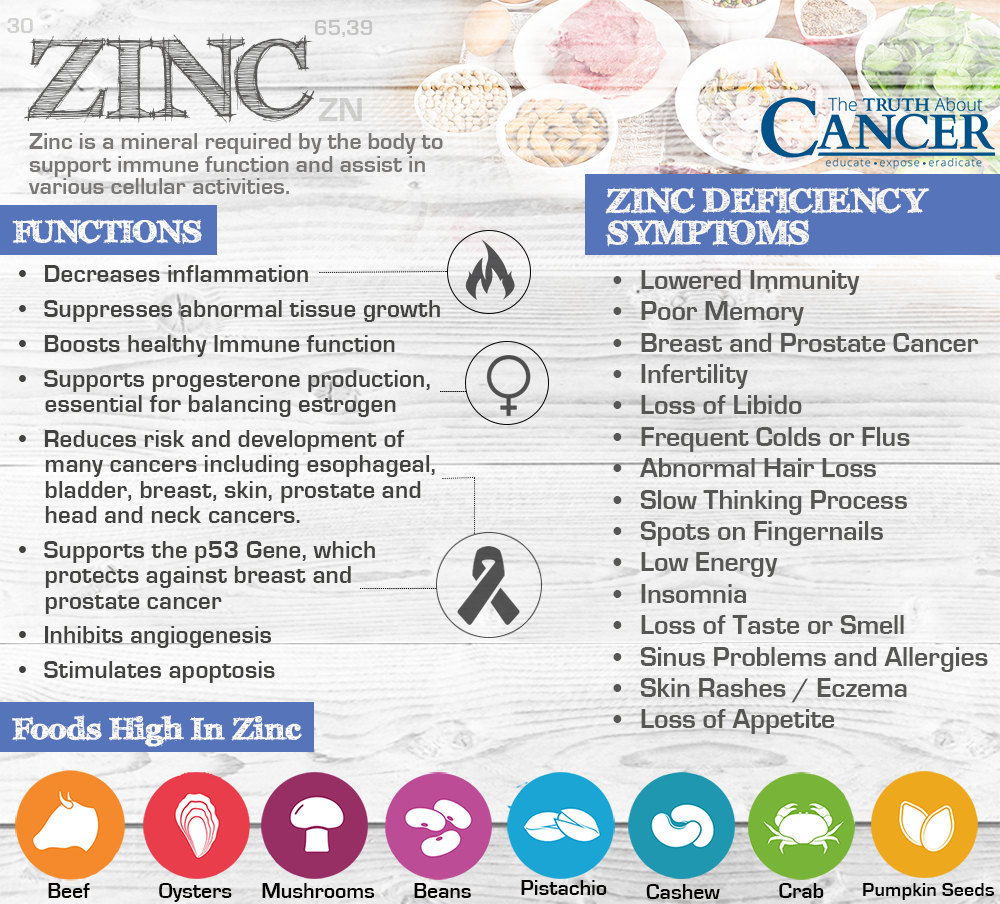Zinc is a mineral required by the body to support immune function and assist in various cellular activities. It also supports more than 300 enzymatic functions. Unfortunately, most of the world is deficient in zinc. Zinc is essential for the development of healthy hormone and immune molecules as well as human growth. This foundational antioxidant to the body stimulates and helps to control a weakened immune system.
An estimated 25% of the world’s population (about 2 billion people) has a zinc deficiency. Experts believe the primary reason for zinc deficiency is a result of an inadequate diet. However, poor biochemical signaling is also a contributing factor to the deficiency epidemic from a functional health perspective.
Zinc deficiencies are believed to contribute to 400 thousand deaths annually. Zinc is especially important for pregnant women and growing children as it assists in cognitive development and regulates hormones such as leptin, IGF-1 (insulin-like growth factor-1) and cortisol.
How We Deplete Our Zinc Storage Levels
A diet high in sugar and carbohydrates creates an unhealthy blood sugar balance thus preventing the body from properly absorbing zinc. Zinc deficiency is a common occurrence in people that lack the ability to absorb the mineral, such as those with leaky gut syndrome.
Phytic acids found in legumes and grains can block zinc absorption when consumed in high amounts. Non-steroidal anti-inflammatory drugs (NSAIDs) also adversely affect zinc levels when they are taken regularly.
Symptoms of a Zinc Deficiency
Some of the most common symptoms which may be a sign of zinc deficiency include the following:
- Lowered Immunity
- Poor Memory
- Breast and Prostate Cancer
- Infertility
- Loss of Libido
- Frequent Colds or Flus
- Abnormal Hair Loss
- Slow Thinking Process
- Spots on Fingernails
- Low Energy
- Insomnia
- Loss of Taste or Smell
- Sinus Problems and Allergies
- Skin Rashes / Eczema
- Loss of Appetite
Your Immune Health is Dependent on Zinc
Zinc is required to maintain immune function and control the Th-1 and Th-2 systems. These systems are a critical part of immune modulation. Zinc increases the activity of the human cytokine interferon alpha responsible for preventing viral replication. Doing so limits the immunological stress on the body and improves immune coordination.
Superoxide dismutase enzymes (SODs) are strong intracellular antioxidants which are reliant on zinc for structure and function. These enzymes help inhibit viral infection and toxic debris from accumulating within cellular matrices. They protect a cell’s genomic sequences which are responsible for gene expression.
Zinc Decreases Inflammation in the Body
The innate immune response is activated when the immune system detects a pathogen and triggers a series of reactions within the body. This process includes the Nuclear Factor – kappa Beta (NF-kB) pathway. Sensitive NF-kB signaling is needed to maintain a healthy immune system but can result in chronic inflammation when it becomes overstimulated.
The NF-kB process requires zinc to bind to a protein within its series to halt activity thus controlling inflammation within cells. When zinc is lacking in diet and absorption, the NF-kB pathway becomes overstimulated creating chronic inflammation which is associated with the development of degenerative disease.
Zinc Reduces Cancerous Cell Development
The regulatory effects of zinc on the NF-kB pathway makes zinc highly significant in the prevention of cancer cell growth patterns. Zinc is associated with inhibiting angiogenesis in tumor cells as well as the secretion of inflammatory cytokines. Zinc has been found to stimulate programmed cell death known as apoptosis in abnormal cells. Normal apoptosis events reduce the risk of cancer growth.
Zinc deficiency can promote a variety of human cancers including esophageal as well as cancers related to the digestive tract, head, and neck. Zinc supplementation has been shown to reduce the number of tumors and carcinogenic severity.
Prostate & Breast Cancers:
Zinc is especially important in prostate and breast cancers. People with the BRCA1 gene have the highest known risk for developing breast cancer. In 2012 a cohort of individuals with the gene identified were examined. The researchers found a lower risk of cancer development in the people with the highest concentrations of zinc. The same study also found that the individuals with the lowest levels of zinc in their bodies had a significantly increased risk of breast cancer developing.
Bladder Cancer:
The association between zinc deficiency and an increased risk for bladder cancer also exists. Not only has research found that patients with bladder cancer have low levels of zinc, but the cancerous tissue itself has significantly low zinc concentrations. Researchers learned supplementing zinc to bladder cancer patients stimulates apoptosis (programmed cell death) and consequently results in an anti-cancer effect.
Skin Cancer:
Zinc supplementation can also lower the risk of skin cancer, however its direct association is uncertain. Men and women naturally exhibit gender differences which affect their immunosuppression pathways of the skin and exposure to ultraviolet radiation. Despite these innate differences, there is a significant association with zinc supplementation inhibiting cancer development of the skin.
Zinc is observed to lower inflammation, suppress abnormal tissue growth, and lower the incidence of larger skin lesions and more deleterious tumors.
Zinc Deficiency and the p53 Gene:
The p53 gene is the primary gene that protects men from prostate cancer and women from breast cancer. This gene is said to be the guardian of the human genome for its protective benefits. A mutation in the p53 gene will therefore dramatically increase cancer development risk. Zinc is essential to the p53 gene in order to reduce the risk of mutations of this vital protector. This occurrence would drastically increase the likelihood for cancerous cell development of the prostate and breast.
Zinc and Estrogen Balance
Dr. David Watts observed that women who had elevated levels of copper, calcium, and boron in their hair minerals also had the lowest levels of zinc − and were at greatest risk for breast cancer. Dr. Watts’ explanation of this finding is that copper and boron increase the body’s sensitivity to estrogen and decrease the effects of progesterone.
Zinc supports the production and use of progesterone. Thus a deficiency in zinc increases estrogen sensitivity and decreases progesterone response. In order to effectively balance the hormones in these women, it is essential to raise zinc levels and simultaneously decrease boron, copper, and calcium concentrations.
How to Address a Zinc Deficiency through Supplementation
Natural sources of zinc are found in oysters, eggs, whole grains, nuts, seeds, shellfish, and meat. Due to the toxic bioaccumulation in oysters and shellfish, these sources should be limited if not avoided. Excellent choices include pastured (grass fed) beef and organ meat as well as locally produced eggs from 100% pasture raised animals. Plant based sources of zinc are found largely in sprouted pumpkin, hemp, sunflower, and chia seeds.
Adults are generally recommended to take 8-11 milligrams of zinc daily. However, functional health experts and most progressive nutritionists will advise that 30-40 mg/daily is preferred. Consuming concentrations exceeding 100 mg/day can create adverse health reactions and actually increase cancer risk.
The best forms of zinc are in amino acid chelates such as zinc glycinate or bisglycinate where zinc is attached to one or two glycine molecules. Glycine is a key amino acid that helps with phase 2 liver detoxification, supports relaxation, and improves symptoms of insomnia.
Another good form is zinc orotate, which acts like an antioxidant in the body much like the zinc glycinate. The form that is used most commonly but should be avoided is zinc gluconate which is zinc connected to a fermented glucose molecule. This form has a low level of bioavailability in the body.
Want to stay abreast of new ways to stay healthy? Be notified each week when cutting-edge articles are added by clicking here. You’ll be glad you did.
Article Summary
Zinc is a mineral required by the body to support immune function and assist in various cellular activities. Unfortunately, an estimated 25% of the world’s population (about 2 billion people) has a zinc deficiency.
Experts believe the primary reason for zinc deficiency is an inadequate diet. A diet high in sugar and carbohydrates prevents the body from properly absorbing zinc. Phytic acids found in legumes and grains can block zinc absorption when consumed in high amounts.
Zinc deficiency is also common in people that lack the ability to absorb the mineral, such as those with leaky gut syndrome. Regularly taking non-steroidal anti-inflammatory drugs (NSAIDs) can also adversely affect zinc levels.
Some of the most common symptoms which may be a sign of zinc deficiency include: Lowered Immunity, Poor Memory, Breast and Prostate Cancer, Infertility, Loss of Libido, Frequent Colds or Flus, Abnormal Hair Loss, Slow Thinking Process, Spots on Fingernails, Low Energy, Insomnia, Loss of Taste or Smell, Sinus Problems and Allergies, Skin Rashes / Eczema, and Loss of Appetite
Zinc deficiency can promote a variety of human cancers including esophageal as well as cancers related to the digestive tract, head, and neck. Zinc supplementation has been shown to reduce the number of tumors and carcinogenic severity.
Natural sources of zinc include: oysters, eggs, whole grains, nuts, seeds, shellfish, and meat. Shellfish may accumulate toxins, so better choices are pastured (grass fed) beef and organ meat as well as locally produced eggs from 100% pasture raised animals. Plant based sources of zinc are found largely in sprouted pumpkin, hemp, sunflower, and chia seeds.
Adults are generally recommended to take 8-11 milligrams of zinc daily. However, functional health experts and most progressive nutritionists will advise that 30-40 mg/daily is preferred. Exceeding 100 mg/day can create adverse health reactions and actually increase cancer risk.





















Thanks Dr. Jockers,
That was another very informative article. I love your work.
Thank you John! I appreciate that!
Can you recommend a good zinc supplement
Karen Roth
Kroth@bhhsflpg.com
Can you recommend a good zinc supplement
Karen Roth
Kroth@bhhsflpg.com
I eat beef and eggs once in a while that contains zinc. Will taking zinc supplements increase your zinc levels?
Yes you want the right zinc supplements as the article explains!
Ooops…interesting article drjockers. Enjoyed the read but it made me think I could be consuming ‘too much’ zinc. I eat pistachios and chia every day, sunflower and pumpkin seeds on my oatmeal every second day, eggs twice weekly, liver once weekly and beef once weekly. I also go through three cartons of almond milk every week and a wide variety of vegetables. Not that keen on fruit although I try to eat one apple a week and a few strawberries and blueberries.
There is a very low chance you will get too much zinc from food sources. This only happens when we supplement with very high doses for a long time. This is because zinc competes with copper (which is in the same foods that have zinc) and they neutralize each other. Additionally, zinc competes with heavy metals and having adequate zinc is one of the best ways to prevent heavy metal toxicity.
Hi dr..i’m abreast cancer servivor with triple negative type
Can i take zinc to help my hair to grow faster?
If i can what the dose and for how long can i use?
Hi Doc,
Just wanted to get on here to say this is one of the best written articles ever!! I used zinplex for 2 months and then realized my warts on my hands went away. I know that warts are cell mutation which got me thinking about cancer and the possible link to zinc deficiency and it lead me to this article. I am blown away! Well done!!
Thank you for much for your feedback and for sharing your story with us!
Most people lose their zinc from a practice called masturbation. This is a touchy subject but the fact of the matter is this practice is very dangerous. When people get sick from cancer or blood clots variety of illnesses.
it’s not attributed to that practice, but the zinc loss is what causes it.
God didn’t design for people to masturbate and this is the price that paid…. on the health.
So men don’t lose zinc during intercourse instead?